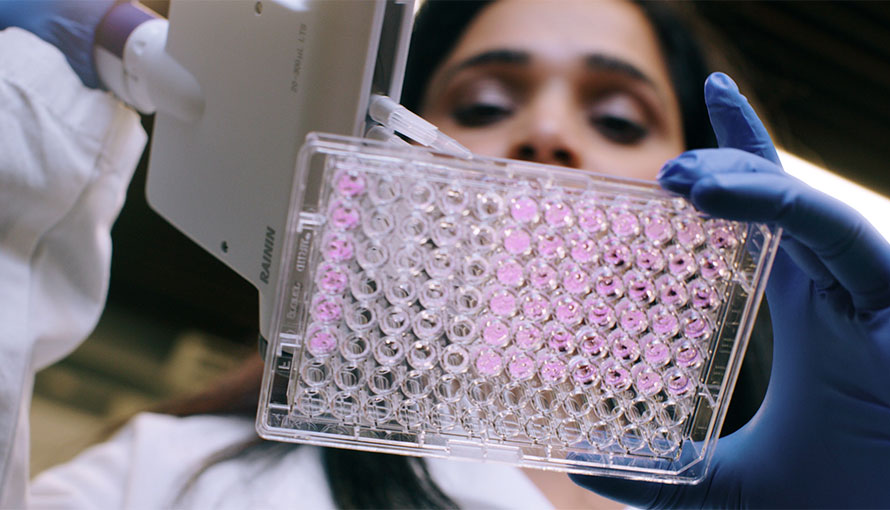Latest Developments in Breast Cancer Research at Moffitt

Researchers in the Breast Oncology Program are uncovering new and improved ways to treat breast cancer. Here's a look at some of the latest developments in breast cancer research at Moffitt Cancer Center.
More information about other breast cancer treatments is also available here.
Creating Preventive Vaccines. One of Dr. Brian Czerniecki’s primary areas of research interest is the development of immunotherapy, including preventive vaccines, against lethal forms of breast cancer and other solid-tumor cancers. Toward that end, he works to identify molecular targets in early breast cancer that can be used to prevent invasion and metastasis.
Harnessing The Gut Microbiome. The team is investigating how bacteria in the gut can help the function of DC1 dendritic cells to best eliminate cancer. The team is seeking to identify the optimal GI gut microbiome from patients who have a complete response from treatment so that nutritional supplements can be made to get the correct GI "bugs" to help the patient’s immune response function optimally. Funding is particularly appreciated in this area as this work is in its early stages but appears to be most promising as a natural cure for many types of cancers.
New Clinical Trials to Open. By mid-year, the Breast Oncology Program expects to open two new clinical trials using a patient’s own white cells to elicit an immune response to cancer. In the case of triple negative breast cancer, the immunotherapy will be mixed with chemotherapy for the desired response. For HER2 positive breast cancer patients, the goal will be for the therapy to reduce the need for chemotherapy.
Treating Triple Negative Breast Cancer. A major project has been initiated that uses the herpes virus as a viral therapy to infect cancer cells and rev up the immune system to kill the cancer. Called viral immune therapy, it has been used to treat melanoma and is now helping to fight triple negative breast cancer at Moffitt.
Studying Immune Response. The team has submitted a manuscript demonstrating how the immune response eliminates HER2 breast cancer by causing the "garbage can" in the cell to get rid of all the extra HER2, which then makes the cells permanently inactive and unable to cause metastasis. More importantly, it tells us how to use the immune system to make therapies work in patients who become resistant to our current therapies.
Predicting Response. An immune blood test developed in the Czerniecki research laboratory appears to predict with high accuracy those patients likely to have a complete response to vaccines and chemotherapy. It may provide a path toward eliminating chemotherapy and guiding a pure immunotherapy treatment.
Preventing Recurrence. The team is conducting a multicenter trial to prevent recurrence in HER2 positive patients with residual disease following neoadjuvant therapy. The trial is open at seven other cancer centers across the country, using a breast cancer vaccine developed at Moffitt.
Treating Metastasis. Using a Department of Defense grant, in conjunction with Roswell Park Comprehensive Cancer Center in Buffalo, NY, the team is treating patients with both brain metastasis and central nervous system metastasis, again, using a vaccine developed at Moffitt.
To learn more about the breast cancer clinical trials currently available at Moffitt, contact us at 1-813-745-6100 or 1-800-679-0775 (toll-free) or submit a clinical trials inquiry form. We welcome patients with or without a referral.
